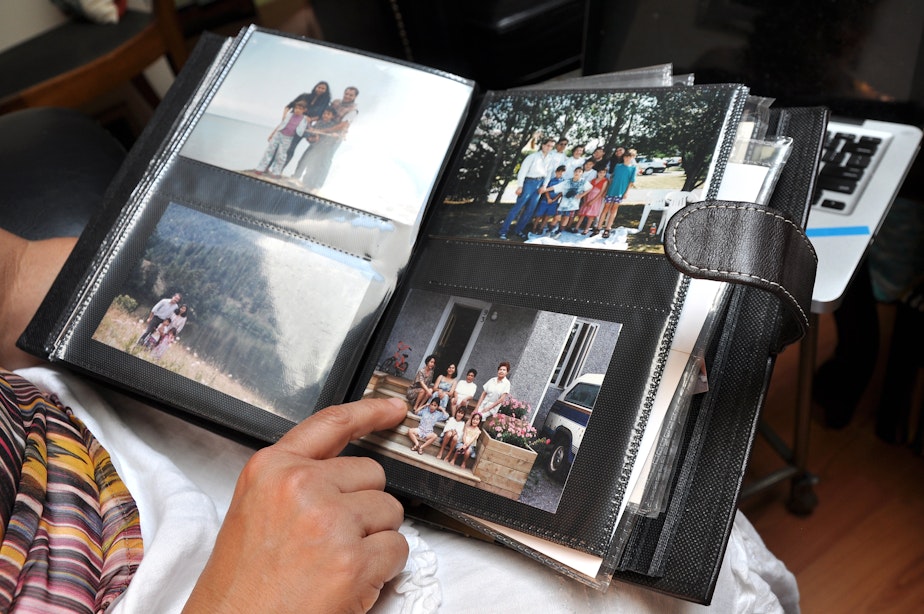War destroyed our family. Facebook brought us back together.

My great aunt, Milagros Ortiz, has an air about her that's warm and calm. Her laugh is loud, and when she speaks, it's right to your soul.
In her house in British Columbia, we listen to traditional dance music she recorded when she visited Nicaragua a few years ago. It's a place she has mixed feelings about because "pain is there." But there's also resilience and joy, my Tia (aunt in her native language, Spanish) tells me.
The effects of war last much longer than we think. This is certainly true for the Nicaraguan Revolution and its impact on Tia's life.
I'm close to Tia, even though I only met her three years ago. Growing up in Seattle, I didn't know much about my Nicaraguan roots.
Now, I love hearing stories about where she comes from. Tia's favorite memories from her childhood in Nicaragua are the house she grew up in and her father's big garden. She loved school, her friends, and the country's natural beauty.
But it wasn't all beautiful. Her dad got sick. When Tia was fifteen, he died.
That same year, 1979, the Sandinista revolutionaries gained control of the Nicaraguan government. It was a revolution intended to serve the most vulnerable, and at first, it was exciting for Tia. But she suffered during the war's violence. Nicaragua turned into a place she didn't recognize.
After her father's death, her half-brother Eulogio stepped in to help out. He lived in the United States with his family and offered to take Tia and her siblings back with him. But another one of Tia's brothers was drafted into the war, and she didn't want to leave without him.
Eulogio left and vanished from her life.
She never stopped wanting to find him.
In Nicaragua, the violence worsened as another phase of the revolution started: the Contra war, or counter-revolution. In all, 40,000 people were killed.
When Tia was eighteen years old, she got married and left Nicaragua. She realized she couldn't have a family there.
"I couldn't live with that fear that my children would be sent to war," she says.
She immigrated to British Columbia. And though she was safe there, it didn't feel like home.
"When you come from a country like Nicaragua, often people assume that I am so happy to be in Canada," she tells me. "No one ever thinks [about] the pain that I feel. That I lost the land where I grew up."
The war was inside her. It was with her wherever she went.
At the same time, Tia longed to find her brother Eulogio. He was her connection to home, to the beautiful parts of Nicaragua she missed.
But he was nowhere to be found. She didn't have a phone number, an address, or a single photo of Eulogio.
She searched for thirty years.
Then a few years ago, a magical thing came along. Facebook.
"I don't know how life helped me," Tia tells me. "It was very difficult. I am not very good with technology."
She found someone with the same last name on Facebook: my dad. She messaged him and asked if his father and her long-lost brother were the same person.
They were. Eulogio is my grandfather.
Tia reconnected with her brother at last. It should have been a happy ending, but it was more messy than that.
She learned that in the years after Eulogio vanished from her life, he left his family in the United States: my dad, my grandma, and the rest of their family.
My dad rejected the Nicaraguan part of his life because he didn't want to be anything like Eulogio, the man who abandoned him. Since my dad didn't grow up learning about our culture, he didn't pass it down to me. I didn't learn Spanish, and I didn't know any of my Nicaraguan family members.
As Tia learned of the pain her brother Eulogio had caused, her image of her hero became complicated. How could this man who tried to save her family be the same one who abandoned his own?
"I thought that your father and your uncles were spared the suffering we had in Nicaragua," Tia says. "I have been very saddened to discover that there is so much pain for them too."
Sometimes pain doesn't have a purpose — or maybe the reasons behind pain are as human and unavoidable as a civil war. The war that separated my family for so long wasn't left in Nicaragua. Maybe people can't help but pass down this trauma to their families.
"I don't know how we managed to survive through generations of people with such traumas," Tia says. "That is something quite common in Nicaragua: pain."
No matter how common pain is, it's hard to simplify. I can't be mad at my grandpa or say that he's a bad person. I've realized that I may never know the full story of our family.
Still, there are good things, especially since Tia found my dad and me.
"For me, it is a gift," Tia tells me. "A big consolation in life. You are a gift to me. The most wonderful gift."
It's been a gift for me as well. Since I met Tia, I have another life. Another family. They tag me in stuff on Facebook all the time. My cousin even asked me to be in her wedding party.
When I travel from Seattle to visit Tia in Canada, she tells me what she wants for me, between feeding me like a plant and showering me with affection.
"You deserve to be happy, to smile, to be resilient."
Tia hugs me tightly.
"To manage to have moments of happiness is the most rebellious act."
This story was created in KUOW's RadioActive Intro to Radio Journalism Workshop, with production support from Mary Heisey and edited by Jenny Asarnow. Find RadioActive on Facebook, Twitter and Instagram, and on the RadioActive podcast.
